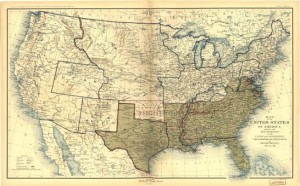 On this Sabbath day, Baptists South and North discuss slavery.
On this Sabbath day, Baptists South and North discuss slavery.
Sam Richards, a member of Atlanta’s Second Baptist Church, writes of today’s church service and of “hateful” northern abolitionists.
Dr. B. preached this morning the funeral sermon for Capt Davis from the text, “He being dead, yet speaketh.” It is sad to think how noble men have lost their lives during the two years that this wicked war has been waged against us by the people of the North. The blood of our brothers would seem to cry from the ground in deprecation of any reunion with their murderers. Union man as I was at the beginning of these troubles, I would now much rather be ruled over by a king of England or France than to be made subject to that hateful race of abolitionists who are clamoring for our blood so eagerly and unrelentingly….
Among those dreaded abolitionists are members of the new Albion Seventh Day Baptist Church of Wisconsin. Today the church building is dedicated. Soon thereafter, in this church that is a “hotbed of anti-slavery sentiment” a secret room is dug underneath the church to hide runaway slaves along the Underground Railroad. Doubtlessly, there is much talk during the war years among the escaped slaves of the hatefulness of slave owners.
Meanwhile, Baylor University, a Texas Baptist school struggling during the war years, hires its fourth president. William Carey Crane, recently called as the new pastor of the First Baptist Church of Houston, declines the prominent church’s call to accept the presidency of Baylor, a school with fifteen students enrolled at the time. Beginning on January 1, 1864, Crane steers Baylor for the remainder of the war, serving as president until his death in February, 1885. As is later written of Crane’s tenure:
One of his first acts as president was to reclaim the buildings where Confederate soldiers had been living. They were “floorless, windowless and roofless” because the soldiers had burned everything that would ignite for cooking and warmth. Then Crane focused on increasing enrollment. He enjoyed some success, due in part to his willingness to accept bartered goods and services to pay tuition and fees.
Crane wrote prolifically and corresponded voluminously with people across Texas and the U.S. He also managed a full load of pastoral and administrative responsibilities, including teaching eight hours a day, five days a week. In addition, he did yeoman’s duty as business manager and public relations director for the University. He personally repaired fences and buildings, planted crops, killed hogs, kept books, built fires, counseled students and parents, solicited funds, attended conventions, lectured on a variety of subjects, wrote numerous articles and several books (including a classic biography of Sam Houston), and was a full-time pastor. He maintained an arduous speaking schedule that included presentations to a myriad of religious, government, education, and temperance groups. He served as the first president of the Texas State Teachers Association and chaired the committee that recommended the founding of Sam Houston Normal Institute which later became Sam Houston State University.
During his two decades at the helm of Baylor, Crane made a valiant but futile attempt to develop a strong, permanent university. He used significant personal wealth in the effort. Much of his time was spent in confrontations with Rufus Burleson who, because he wanted Waco University to be the primary Baptist school in Texas, fought Crane for the public eye and the Baptist dollar. Crane’s death in office on February 27, 1885, ended the controversy and opened the door for the unification of Baylor and Waco Universities the following year.
Thus while the vitriolic debate over African slavery continues unabated, one Baptist school charts a course that will bear fruit after the war.
Sources: Samuel Pearce Richards, edited by Wendy Hamand Venet, Sam Richards’s Civil War diary: a Chronicle of the Atlanta Home Front, Athens: University of Georgia Press, 2009, p. 192 (link); “History of Albion Seventh Day Baptist Church” (link); “This Week in Baylor History, August 16, 1863” (link); “William Carey Crane” (link) and (link); William Carey Crane papers (link)


